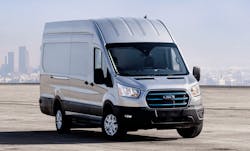Ford E-Transit Van Promises Low TCO
Ford Motor Co. unveiled its 2022 E-Transit all-electric cargo van and says it will be built at its Kansas City assembly plant starting late next year, with prices starting at under $45,000. Looking much like current gasoline-powered Transits, the new product will be rear-wheel drive, have similar cargo capacities, come in three wheelbases and eight body configurations plus chassis-cab and cutaway versions, and include advanced connectivity for effective managing of the vehicle and its driver/technician, said Ford executives.
The Ford E-Transit will cost less to maintain and operate than gasoline vans and thus deliver a lower total cost of ownership, they said. Its battery pack will be mounted beneath the floor, and will be good for a range up to 126 miles. It will include a grille-mounted port for charging at home or at users’ garages and terminals, using charging equipment available from Ford. An optional inverter and outlets will supply up to 2.4 kW of on-site power to run electric tools.
“Ford is North America and Europe’s commercial truck and van leader, so the transition of fleet vehicles to zero emissions, especially for the fast-growing last-mile delivery segment, is critical to achieve our carbon neutrality goal by 2050,” said Jim Farley, Ford president/CEO. “Ford is ready to lead the charge, starting with the all-electric Transit and all-electric F-150 on the way. This is good for the planet and a huge advantage for customers to help lower their operating costs and provide connected fleet management technologies that will help their businesses.”
E-Transit will offer the same interior cargo dimensions and standard mounting points for use by upfitters to install the same bins, shelving and accessories as on gas-powered Transits, Farley said. The E-Transit will be backed by Ford’s 645 commercial vehicle centers across the U.S., about 90 percent of which are electric vehicle-certified, for easy sales and service.
The majority of U.S. Transit vehicles sold last year were upfitted, and Ford continues to provide the same upfit financing support for van customers, including those who purchase or lease. With 13 upfitters located within 30 miles of the Kansas City assembly plant, customers get fast delivery to their chosen upfitter, removing the need for upfitting after delivery and helping them get on the road quickly.
Scheduled maintenance costs for the all-electric Transit are estimated to be 40 percent less than the average scheduled maintenance costs for a gasoline-powered 2020 Transit. Ford also promises greater uptime for the electric van. The E-Transit is warranted for eight years/100,000 miles.
“We are doubling down on software and digital services to help our fleet customers grow and more efficiently run their businesses,” said Farley. Extensive operating data will be available to owners to, among other things, know when their E-Transits need recharging and tell drivers to seek a station. The nearest location of a public charging station will be shown to drivers on a 12-inch touchscreen monitor.
E-Transit is part of a Ford investment in electrification of more than $11.5 billion through 2022, Farley said. The all-electric Mustang Mach-E small SUV begins arriving at dealers later this year, while the all-electric F-150 starts hitting dealers in mid-2022. Ford intends to achieve carbon neutrality globally by 2050. It says it’s the only full-line U.S. automaker committed to reduce CO2 emissions in line with the Paris Climate Agreement, and is working with California for stronger vehicle greenhouse gas standards.
Ford, which claims to be the leading commercial vehicle brand in North America and Europe, has been making Transit-family vehicles for 55 years and commercial vehicles since 1905.






